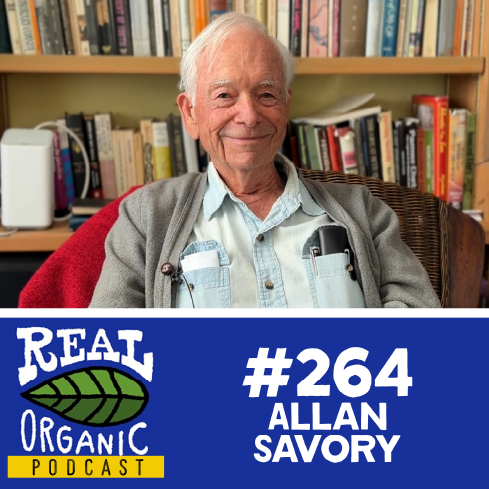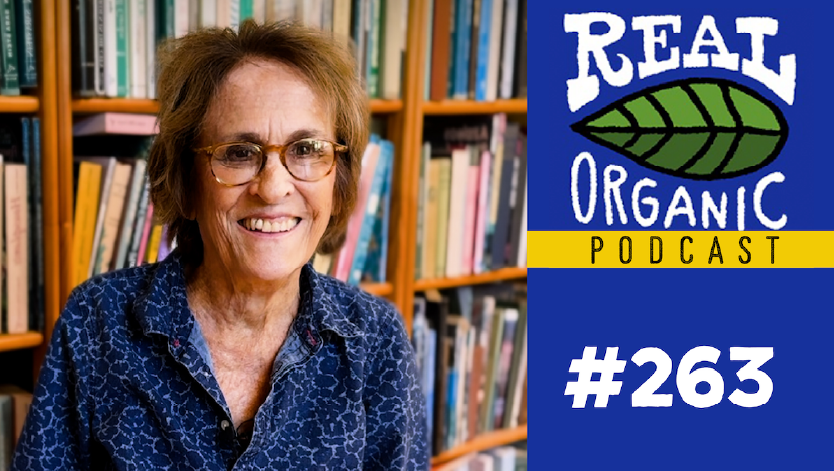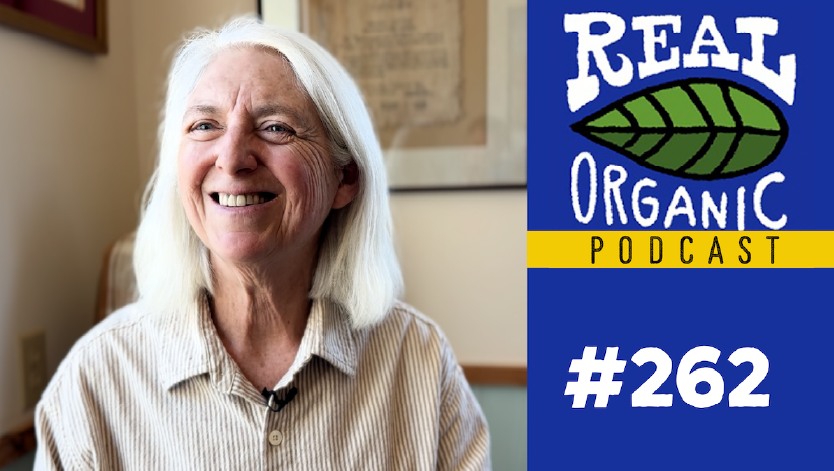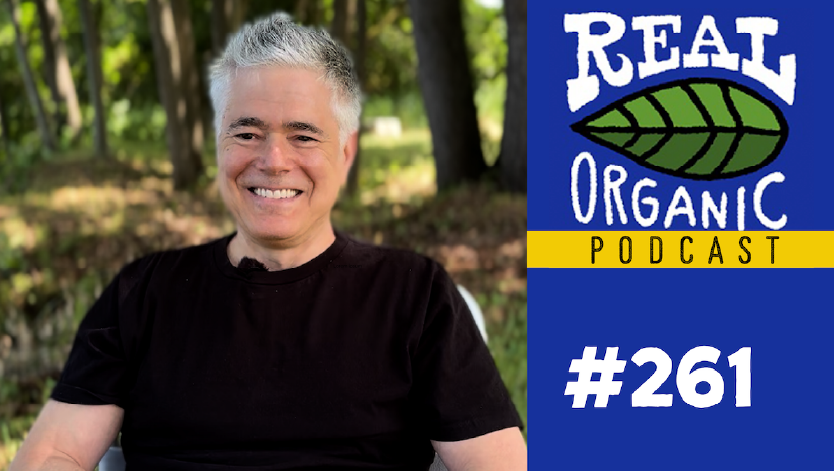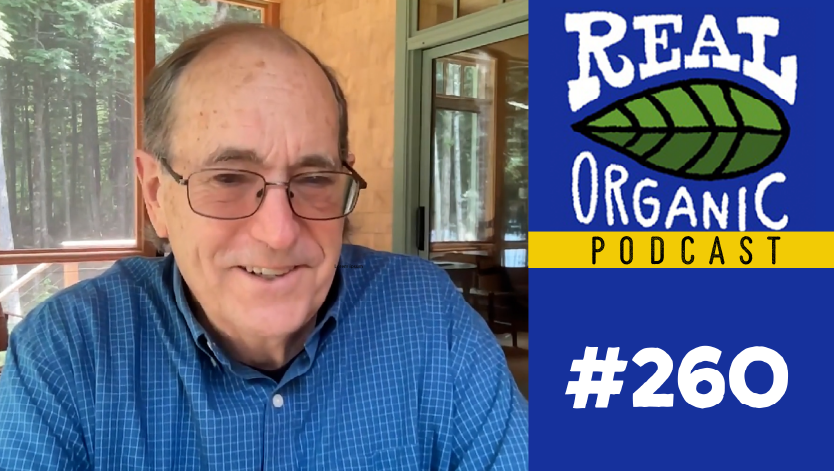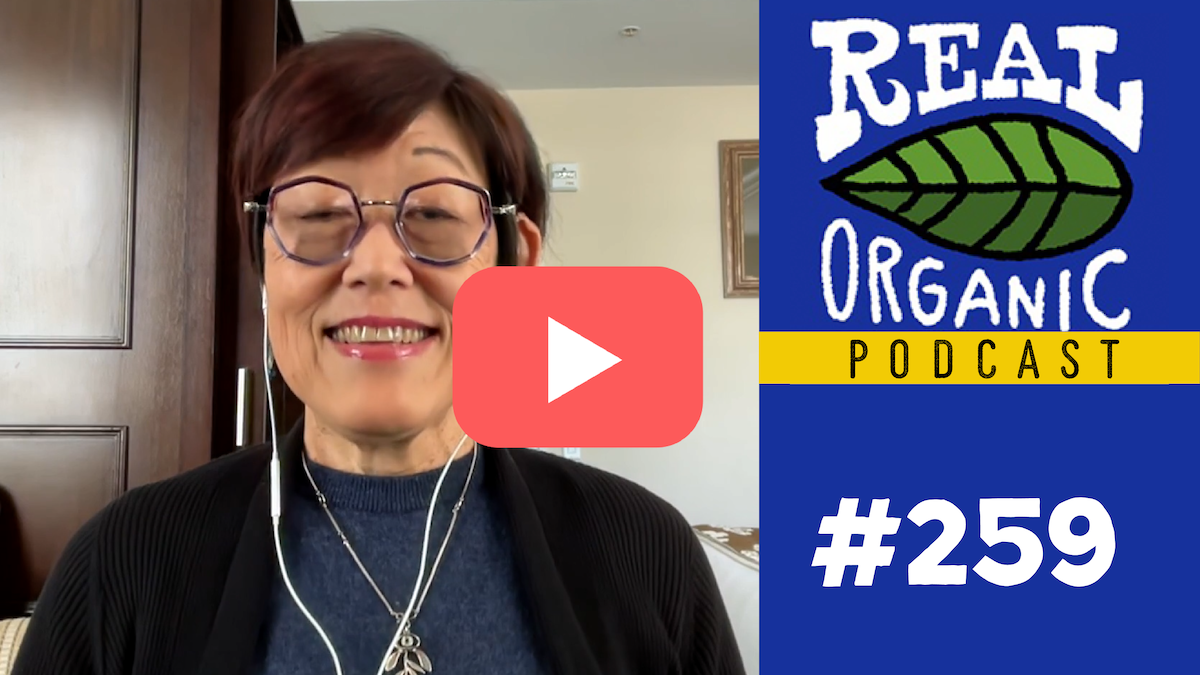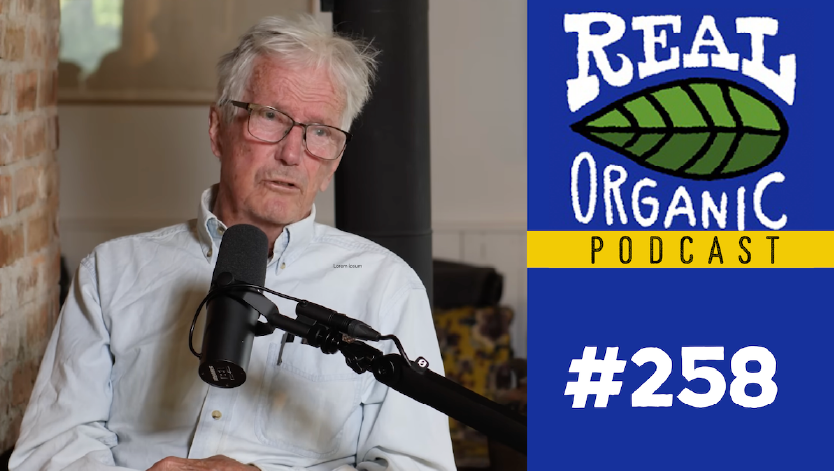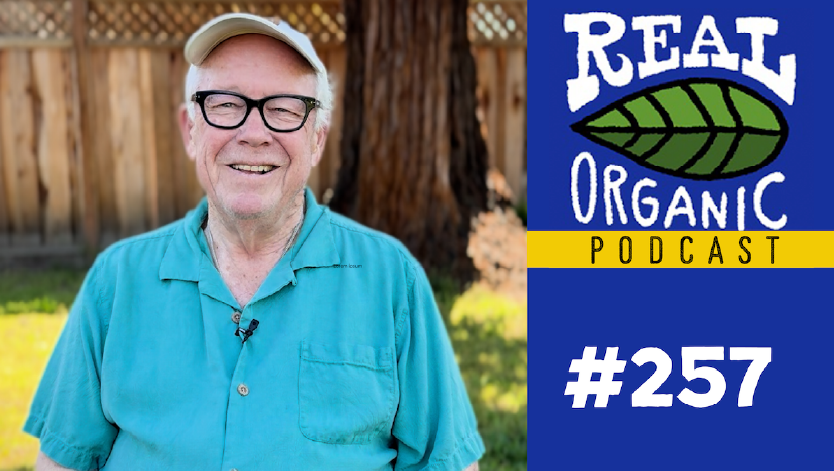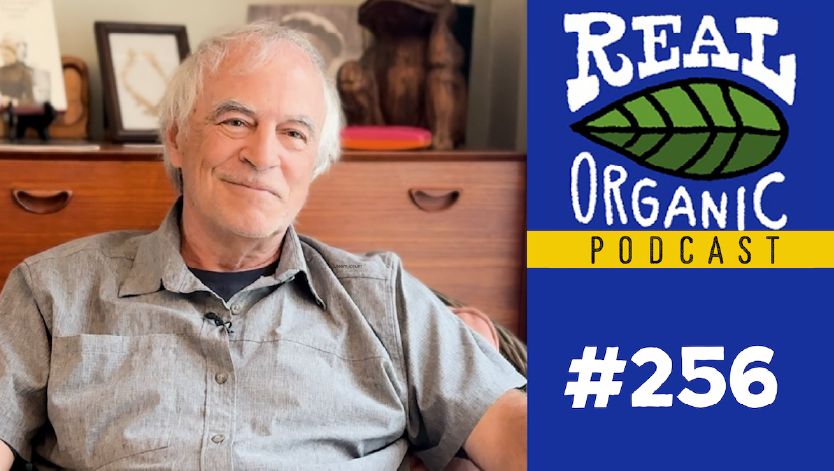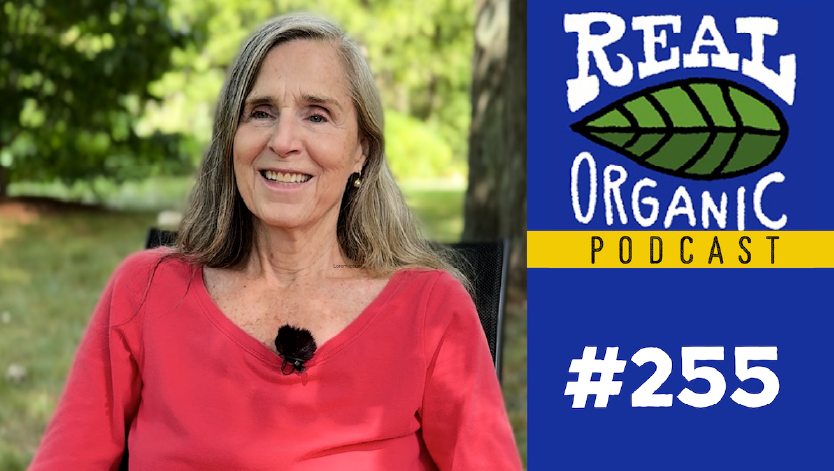Episode #194
Coalition of Immokalee Workers: Building Successful Movements + Boycotts
Welcome! You can subscribe and download episodes of our show through your favorite podcast app.
You can also subscribe to receive the video version of each episode on our YouTube channel.
Our Coalition of Immokalee Workers Interview with Greg Asbed and Gerardo Reyes Chavez has been edited and condensed for clarity:
Dave Chapman interviewed Gerardo Reyes Chavez and Greg Asbed in California adter the EcoFarm Conference in January of 2024:
Dave Chapman 0:00
Welcome to The Real Organic Podcast. I’m talking today with Gerardo Reyes Chavez and Greg Asbed, both from the Coalition of Immokalee Workers. So welcome. I’m so pleased that we got to talk I’ve been speaking with you for a day now, two workshops and time in between. I’m going to ask you to repeat a few of the things that you’ve talked about forpeople who weren’t there. So if you know from your own personal experiences, could you describe the Coalition of Immokalee Workers and how you came to be part of this?
Gerardo Reyes Chavez 0:45
Well, for me, it was the search for a job. You know, I’m a farm worker. Since I was 11 years old. In Mexico, I was working in the fields, and I was going to middle school. So whenever there was a job in the evenings, weekends, there was no vacation. Because there was the need to survive. And I came to murkily to say, heard about the work. I heard that if you were working in the fields back then you could earn, if you were the slowest worker, you could earn like $70. But if you were fast, you could earn more than 100. And back then, you know, that seemed like a pretty decent amount of money. Yeah. So I came to work. And when I arrived, I encountered that all of those were lies. We were working a group of us, myself, we’re working harvesting tomatoes, the boss stole our wages, got mad because we asked for $20 to buy utensils and basic staples, because we were getting sick with the food that his sister in law was selling. And he got mad that we didn’t want him to continue like that. So we didn’t have a job. The next day, we didn’t have a home money, we didn’t know anybody that was our welcoming to Immokalee. In the process of looking for a job desperately and trying to find a place to sleep. We ended up sleeping in the boss of another crew leader, they gave us a job. And we had to be there for more than a week. In total, there was like two weeks probably where we didn’t have a place to go. So in that desperate search for a job, and for home to rent, we met these workers that were coming back from Chicago at the time, that were part of the second case of modern day slavery, the quail case that the Coalition of Immokalee Workers helped to bring to justice. So it was them. That introduced us to the work of the CIO. Luda told us about how they were bought and sold, and how they escape and get help. They were finally free. But it was it was them that connect me to the work of the coalition. I went to the meetings, there was the last action that was focusing on trying to bring the agricultural industry to the table a march of 234 miles. And then I was learning about all the actions that happen in the 90s. And we very quickly learned about all the horrible conditions that are part of this job. And since then, you know, I got involved, started to participate. And then I became a part of the CIW.
Dave Chapman 4:01
So just just for people who haven’t been part of the conversation, amok, Lee is in Florida, and it’s a town that’s kind of the centerpiece of the Florida tomato industry. A lot of tomatoes go in and out of that town. Yeah. And you’re talking about 20 years ago that there was slavery in Florida, who I’m
Gerardo Reyes Chavez 4:24
talking about. How, you know, when I arrived, there was the second case when there is slavery, but there’s been many other cases. It was not something that happened wasn’t just a one off thing. It was something or is it something that was happening almost every year? Yeah. And continues to happen, you know, outside of the protections of the Fair Food Program, which we will touch upon. And that’s why this conversation is so important for us.
Speaker 1 4:55
Absolutely. Great. How’d you get to this? Yeah,
Greg Asbed 4:59
Oh, life is a funny thing. I mean, you know, life takes you if you let it life will take you all kinds of places and mine. Right after I got out of college mine took me to Haiti for several years, where I lived and worked and was extremely fortunate to be able to be trained by a peasant movement of Haiti and peasant movement of papaya and MPP. In techniques of what they call animation, which is the closest thing you call it is organizing here in the United States. But it’s it’s different from traditional us organizing. And so I worked for several years with animators in Haiti on the process of democratization, the following the devalue 28 years devalued dictatorship because I was there between 85 and 88. And the experience, the tools, the vision, of commitment that I was able to gather, while I was there in Haiti, I brought home with me, to the US when I came back. And again, without getting too much into the way life moves you. I ended up being asked to help translate for Creole Haitian Creole, for a farm worker lawsuit in the area of eastern shore of Maryland, where I was living, which exposed me for the first time really in the US to the reality of farmworkers. I hadn’t seen that before. I didn’t, you know, it wasn’t where I was pointed in my life before. But then having seen that, and then having the language capacity and the training I had, again, and one thing led to another and my wife and I moved to a McCulley, Florida, which is, as you said, it’s a it’s a base community. It’s a community for the entire east coast, that that is home to 20 25,000 farmworkers, you know, and they live there nine months of the year. And then the rest of the year they travel along the east coast to work to follow the season. And so we moved down there to work with a legal services organization that was working in providing free legal services for farmworkers who encountered problems. But it happened to be that we were there at the same time that a lot of people from Haiti from Guatemala and from Mexico are arriving to Hockley as refugees, political refugees, economic refugees, but arriving with the same particular set of skills and borrow a term that I had acquired in Haiti skills of organizing and doing community education. And And all we’re there as farmworkers, including people I’ve worked directly with in Haiti, side by side working for for several years. And we realized that together we had tools to try to address the kinds of conditions that I just mentioned, in a way that had never been done before in the US. And so in the early 1990s, we started to do that we started and we borrowed a room from a local Catholic Church started a process of weekly meetings in town, where we just basically brought people together who are interested in understanding and thinking critically about the conditions that they face and understanding why farmworkers are poor, understanding why farm workers are forced to face some of the worst abuses this country has to offer and labor, when in fact, obviously, farm workers provide an incredibly invaluable service to the country. So why does that happen? And we started examining that question together. And that led eventually to the CIW coming together.
Dave Chapman 8:48
CIW is the Coalition of Immokalee Workers. So why are farmworkers poor? Why are they treated so very badly?
Gerardo Reyes Chavez 9:04
I think that it is starts with a devaluation of the humanity of workers in the fields. Everywhere, you know, not just here. But I think that the reason why in the United States agriculture, we are support, it’s was the obvious reason of stagnation of wages when when we ask why those wages are stagnant. If we analyze which we did, the forces that work on top of the agricultural industry, and that happened after the first decade that the coalition was organizing several actions, you know, to end the situations of violence that were very common situations of sexual harassment, wage theft, and in the extreme conditions of modern day slavery alone, many other abuses, the completion is big. All of the has been a reflection of a power that on the top of the agricultural industry has always been worried only about the quality of the product was used to basically ask for the lowest possible price. And I’m talking about the retail food industry in this country, whether it is fast food, supermarkets, food providers, that type of power, the power of their purchasing order, was being used to ask for a certain size of tomato, a certain state of maturity. But overall, the lowest possible price to maximize profit, that
Dave Chapman 10:45
was the easiest way for them to maximize profit, to push down the labor, exactly.
Speaker 2 10:50
The only place where they had the power to actually keep prices they sell, so they pay stagnant.
Gerardo Reyes Chavez 10:55
Exactly. So when you look at, you know, the price of the bucket, like a bucket that was being paid 40 to 45 cents, that’s a bucket
Speaker 1 11:05
of tomatoes, like a bushel, yes. So
Gerardo Reyes Chavez 11:09
32 pounds at that price, you would have to pick nearly two and a half tons of tomatoes, just to make the equivalent of minimum wage. 30 years of that same wage is no coincidence, if you look at it as an isolated thing, and don’t think about what’s on top of the agricultural industry. You might not get to that point. But as a community, we were looking for those types of connections. Yes. And we got to the point of understanding that the extreme poverty that we as workers were living with, was connected to the extreme wealth at the other end of the spectrum, within an industry that was so powerful, that have a lot of influence, that was using that power, to get those prices down, forcing the agricultural industry to cut cost of production, by maximizing production with a lower margin of profit, but still needing to cut costs of production somewhere, the workers were paying, it was with the labor force that they were saving that money to keep those contracts going. So in a way, agricultural industry was also in the same side of the farm with us. But we didn’t know that it had to be space of about a decade in which the community had to organize the different actions, three general strikes, a march against violence, in it six general strikes, 9597 and 99, a hunger strike by six workers for 30 days, all of that, to try to have dialogue with the growers, to talk about how to eliminate all of these abuses that I just mentioned. But, you know, it took all of these actions to realize that the change needed to come from the tap, that the real power over the industry, and impacting directly or indirectly, the lives of all of us as workers needed to also be part of the solution, in this case, the market. So
Dave Chapman 13:30
when you started, when the coalition began, you related to the problem is being the farmers, the farm owners that that obviously, they were treating, some were treating some people very badly with very illegally. But over time, you began to understand that in many ways, they were in the same boat, not the same boat, but but they didn’t have as much choice as they might have because of who they had to sell to. And
Gerardo Reyes Chavez 14:01
I think that the both of us, us as workers, as well as them as growers needed to come to the realization which with the campaign for fair food was placed in a in a different context, you know, we were, at the same time, you know, feeling that pressure in different forms, workers suffering from conditions of poverty, having to live overcrowded in dilapidated mobile homes. And then the mistreatment without any one, you know, any type of power to address any of those things. That was, you know, part of the way in which food was being produced. All of those things were connected. And all of that gave rise to the conditions of modern day slavery, the cases that continue to arise we needed to have a The market also doing its part in buy in, in a responsible way. And that’s why we started to analyze, you know, what were the connections, there was an article that came up on on a magazine, the packer, where Taco Bell was describing a connection they had with some of the farms that we work with. And based on that we understood, you know, that, that connection, you know, we need to talk to Taco Bell, we need to let them know what’s going on. And I’m sure that they are gonna want to do something about it, when they knew that there’s all of these abuses going on in this industry, and that they could use their power to try to help us solve all of this, we were wrong, they weren’t ready to hear something like that. So it took several letters. Finally, after understanding that the market was like going to move on its own, we decided that we needed to create an alliance with consumers, across the country to us, them to sit at the table with us to work with us, and use their buying power, not just to get the highest quality possible of the products, but also to to ask their suppliers to treat workers with respect in the fields.
Dave Chapman 16:33
So that was a very different strategy from where you started. Yes,
Speaker 2 16:37
couldn’t have been more? Yeah, yeah, no, I mean, we, when you are in the fields, and you’re working, you really you can’t see, literally, almost you can’t see beyond the immediate boss, which is usually a crew leader, you know, the farm labor contractor. And even in the fields in the market, but the size of the farms is quite large, you don’t even see the farmer, the owner, you don’t they don’t appear in the farms. You just see the supervisory level. And, and when the abuses are coming from directly from those people, the abuses that are happening directly, whether it’s sexual harassment, or verbal or physical abuse, whatever it is, or just stealing your wages, taking taking your money paying you half of what you’re owed, and telling you to take off. That’s obviously it’s where your mind immediately goes is, well, if that’s the problem, I need to fix that problem, right. But you realize eventually that that that that produce is a subset of agriculture. Agriculture is just a subset of food. And that whole industry is connected. So the food the buyers of produce, don’t just buy and sell produce, they buy and sell everything in turn in terms of food, and the purchasing power they have, especially over those 30 years of stagnant wages, and purchasing power that they accumulated. When you think about it. This was 50 years ago, at this point, when you start counting those 30 years. Walmart was just a few stores 50 years ago, which is impossible to believe at this point, but it was just a few stores, right? McDonald’s, the same thing was just a, it was a chain that was just starting all the things and they didn’t have the purchasing power of 10,000 restaurants that they could wield. And when you look at markets, really all they are is a network of negotiations, right from the top to the bottom. And in negotiation is very simple. You know, power is in size, the bigger you are, the more powerful you are, and the more you can dictate the end result of the negotiation. And, you know, I think most farmers in this country would call themselves price takers, not price setters. And then they’re not just price takers for what they sell before they buy as well. You know, you can’t tell Exxon, that I’m gonna pay you less for diesel next year. Right? You can’t do that with John Deere, you can’t do that with a bank. You can’t do that with anybody that you buy the inputs from to do to produce the one person you’re bigger than though is the individual worker. And so as a, as a farmer, it wasn’t even necessarily intentional. It was just a factual sort of exploitation that was a way of staying afloat. Right. And, and that, what that meant was over those 30 years of completely stagnant piece rates for tomato, a bucket of 32 pounds, tomatoes, people’s lives each year got cheap, it got worse and got diminished. And at some point, the community in the early 1990s decided that was enough. And and the problem was at the analysis hadn’t been hadn’t emerged yet from the process of, of organizing and critically analyzing the situation. So the first actions were traditional sort of, you know, attempts at bringing employee After the, in the dialog and, and the results were minimal. But once once we realized that that, in fact, what Harada was, was explaining that behind what we immediately see there’s much greater power and at that greater power, it’s possible to harness that power to reverse the impact and make it use the power of those buyers to not just improve wages, but more importantly, to improve conditions to actually create to demand human rights compliance from their suppliers, because they can demand anything they want from their suppliers, given their power, given their size. And they just simply hadn’t needed to nobody was asking them or demanding that they demand from their suppliers compliance with fundamental human rights. And that was the campaign for fair food. That’s what we, what we launched, it was a different idea back in in 2001, it was, it took a long time to explain to the public what we meant by fair food, but amazingly, beautifully, and
Dave Chapman 21:00
worked. So critically, it wasn’t actually that you went and convinced Taco Bell or Walmart, that they should change, because they should be better companies, it’s that you went to their customers, right?
Speaker 2 21:13
Because again, markets are negotiations, right. And the market, we all think of as consumers that Walmart is the biggest buyer in the world. And in fact, they are the biggest individual buyer in the world of most things, right. But Walmart sells to so the biggest buyer is actually the consumers who buy who have all the purchasing power in the world. But consumers, as a rule, act individually, they don’t act collectively, they don’t act, they don’t purchase in any kind of collective way. What we did was to say, we need you as consumers to tell Taco Bell that you won’t buy from Taco Bell, if they don’t demand human rights, compliance from their suppliers, where we work whether whether the Farmers Market at work. It was it was an idea that had obviously boycotts that happened before. But the end result that we were looking for, was actually a legally binding agreement with Taco Bell between Taco Bell and the farmer community that they would only buy from growers who protect their workers rights. And that was new, that was entirely novel. Yet, somehow, After four long years, we managed in 2005, to negotiate a binding legal agreement. Let’s talk about just about
Dave Chapman 22:34
it just just to help people understand a little bit in those four long years. What was the actual campaign that you did to reach the consumers and persuade them? Well,
Gerardo Reyes Chavez 22:43
we, we organize in our community, and we leave the fields, basically stop working in the fields for two weeks at a time, get into two bosses and a couple of bands, and just drive all the way from Immokalee. Stepping in 15, sometimes 17 different cities, on the way to Irvine, California, where the headquarters of Taco Bell is. And then in that process, we realize that it’s fine company, yum, brands, had the power to sign the agreement. So we made made it two steps as we were progressing into that campaign for Fairfield. That meant for us stopping and making connections with students at universities, visiting churches staying in church, the floors of churches, and making presentations. They’re doing actions, you know, marches in every place that we could coordinate with the communities that we were visiting, on the way to California and back. And it was through that, that at the end of the boycott, four years from being a absolutely unknown community. Immokalee literally didn’t appear in many maps, even to become the point of reference at that moment of farmworkers fighting desperately to be able to have rights in their workplace and their dignity protected. So there were 300 universities that were organizing in solidarity with the farmworkers of Immokalee. There were 32 different denominations that in one way or another represented by the National, the National Council of Churches. They heard about this fight and that open the door of many churches that wanted to do their part. So it was that kind of support as well as the connections with the with of workers in different cities, different states, that brat Taco Bell, to realize that it was time for them to reconsider their position. The students started their own campaign, which they call Bucha. The bell, which consisted in basically asking the administration to cut any ties that they had with taco Bilasa Corporation until they come to the table, there were 28 contracts, including some athletic sponsorships, and some actual restaurants, that I’ll lose their ability to be in 20 different universities, because of the campaign, that along with all the actions that we’re taking across the nation with us, led to Taco Bell, and then yum brands, finally, coming to the table to sign the agreement in 2005. And
Speaker 2 25:59
today, immense credit. I mean, it was a it was a struggle, it took four years. But they took a step that nobody had ever taken before. In the end, they did something that no other Corporation had ever done before. And took that leap of faith. And it was a real, it was actual leadership, you know, and the proof is in the pudding, because after Taco Bell did sign this agreement, saying that we will only buy from growers who are respecting workers rights, and workers will be the people who determine if that’s the case, and we’ll pay a premium to help improve wages 13, more corporations follow suit. So what they did was was was an actual act of leadership that actually established the first, the first worker given social responsibility agreements, the model that the federal program gave birth to a model that’s now broadly called in, in, in countries across the globe. So we’re operating in five continents that establish those ideas, that one, these companies are responsible for the human rights conditions at the bottom of their supply chains, to that they have the power to improve those conditions, through selectively purchasing from suppliers, who actually respect their rights. Three, that workers need to be the leaders in the in that need to be frontline monitors of their own rights and determining whether suppliers are in compliance. And for the premium to help improve wages, or to help improve conditions, some sort of price premium is essential to help actually concretely change people’s lives. Those principles now are, are in operation in supply chains from Bangladesh and textiles in southern Africa and the tsutsu. They’re, they’re adopting in the UK in the fishing industry. They’re there, we’re in South Africa and Chile, possibly in Mexico, it’s now become clear to workers around the world at the bottom of these global supply chains, that the same dynamics that took us a couple of decades to understand, exist everywhere, you know, that that that chain of power, that creates poverty and abuse, and it’s in its normal operation can actually be changed, it can actually be reversed. And it can help diminish the poverty of the people at the bottom of the supply chain, and help and the abuse if properly harnessed, properly motivated. And that’s and that’s happening, that process of of, of harnessing the purchasing power of these major brands is happening and its supply chains around the globe today.
Dave Chapman 28:35
It no great damage to either the farms or the multinational corporation contrary
Speaker 2 28:40
to their benefit, because it is it is damaging to Kroger Kroger so far is a company that’s refused to join the Fair Food Program. It’s a massive company. Kroger has been connected over the past four years to three major forced labor operations by the US Department of Labor by the Justice Department. For some reason, Congress seems to think that that’s okay. The three major forced labor operations being conducted over the course of four years isn’t acceptable outcome. And I can’t understand how that’s the case. Even less, is it possible to defend that position when you consider that there is a program the federal program, which is proven and every single law enforcement agency in the country stands behind this to be the only certification program capable of stopping preventing forced labor. So there’s a solution, there’s a problem. And yet, companies like Kroger still refuse to actually adopt the solution for whatever reason, so there’s a lot more work to be done. But that can’t be good for Kroger. Kroger wants to acquire Albertsons. The issue of their connection to sort of supply chain slavery problem is coming up in those conversations, right? That’s not good for Kroger, and that’s something that they should actually do. Solve and put behind them. But and the opportunity is there to do so. Yeah. And
Gerardo Reyes Chavez 30:05
then they, they spend resources in a nap to comment on to what a real solution is, which would be really easy for them to just join, sign on to the program, and committed to the same thing that 14 other corporations are doing. And it’s being shown to the world. It’s something that is inspiring workers in many of the places to don’t have any of those situations connected to their brand, and they don’t have it, this makes them look good. They don’t have to do anything like groundbreaking, that requires a lot of work for them. They simply have to, you know, do what others are doing, and, and continue with the business and be a leader. You know, yeah, I
Dave Chapman 30:55
suspect that their fear of losing control is so great, that they’d rather be in control of something terrible.
Speaker 2 31:03
I mean, what are they? What do they control? I hopefully they don’t control the results that they are getting now from their current Yeah, approach because
Gerardo Reyes Chavez 31:10
they are afraid of losing control, then they are losing it anyways. Because they are associated with things that I’m sure they wish they were mad. But their own positioning on the wrong side of history. Stubbornness is bringing them, you know, to look horrible, and be part of the problem in front of a world in which you know, these kinds of pieces of information flow really quick. And their brand is suffering, I’m sure. The damage to the reputation that they shouldn’t have. Yeah, they could they could have like beautiful publicity.
Dave Chapman 31:55
They could be the great leaders. Exactly. And celebrated. Exactly, yeah. Well, you’re doing so much to lead so many corporations to that. One last question. I know you gotta go. I know you gotta go. But we talked earlier about NAFTA. And I was just really struck by talking about that, that was kind of pivotal point in that it essentially impoverished small farmers in both Mexico and the United States. And it created a shift in the agriculture to much larger centralized farms. Did I get that right?
Gerardo Reyes Chavez 32:29
Well, in Mexico, what happened was that you will see how corn from the US was brought on to the corner supose stores controlled by the government over there as a way to, you know, decrease the cost of living in impoverished areas in Mexico. And what, what happened is that if you were producer of corn for generations, then all of a sudden, you didn’t have a price for you product for your own corn. And people that were poor had to, you know, buy the cheapest option, which was working against those already impoverished communities. So the way of living for many small farmers was destroyed. And people had to find a way to still put food on the table. So you go to the big city, you go to the maquiladoras, wherever there was a job, and that basically forced migration of many workers onto the US too.
Speaker 2 33:37
And real quick on that point, you know, before and after the, the split of the market between the United States and Mexico for providing in satisfying us demand for tomatoes, for example, was probably between 8020 7030 us, you know, 2030 from from Mexico. Today, that’s been flipped. It’s probably about 20, or 30, from the US production and 70 or 80%, from Mexican production, satisfying us demand for tomatoes. The problem with that is in the interim, the US tomato industry has become the best workplace for farmworkers, the United States and large scale production. It’s got the Fair Food Program, it is a leader it is the leader in in human rights for farmworkers, in in the produce industry, by Mexico has done little or nothing to help farm workers and farmers have absolutely no protections against violence against retaliation, if they do bring up problems at work because there’s no there’s no program and there’s corruption and violence and all the other things that happen all the time they have really low pay and incredibly low pay. So what we’ve what NAFTA has achieved is taking all that production, all those jobs, all that all that all the lives connected to the production of tomatoes, from the best workplaces and put in the produce industry day and shifted it to some of the worst workplaces. And it’s because price is the dominant factor in most buyers decision making. That’s not going to change anytime soon. And it’s a crime. It’s a crime because there’s there’s a program in the federal program that absolutely has changed lives. It’s eliminated sexual assaults, eliminated, forced labor, eliminated wage theft, all those things. It’s it works. And it’s proven to work and every law enforcement agency in this country agrees. And yet NAFTA, took those jobs shifted them to Mexico, and they’re gonna stay there for some time.
Gerardo Reyes Chavez 35:33
Somehow, ironically, you know, from the 5 million, which is what they estimated NAFTA would display. Out of the fields, that 5 million small farmers that those who are working here are now forced out by economic reasons, of their own realities. And are part of this program, as are part of the Fair Food Program, you know, working in all of these farms, the hope, you know, in expanding the protections that we have already landed in Florida, working with the growers, and with these 14 corporations, expanding it to several states, up the East Coast, to Colorado to California. It’s those, you know, realities that force people out, that forces them into the conditions that we were forced to work to change, that have the possibility of now bring those protections back because the market, the corporations, you know, are everywhere into the Mexico. So, if we’re able to expand the appropriate program, to more firms in the United States, there’s also a possibility down the line that this might be something that we can help establish back in Mexico to Yes, by the same forces.
Dave Chapman 37:02
I know. Thank you so much, guys. I really appreciate it. I know you gotta go.
37:06
Thank you very much.


